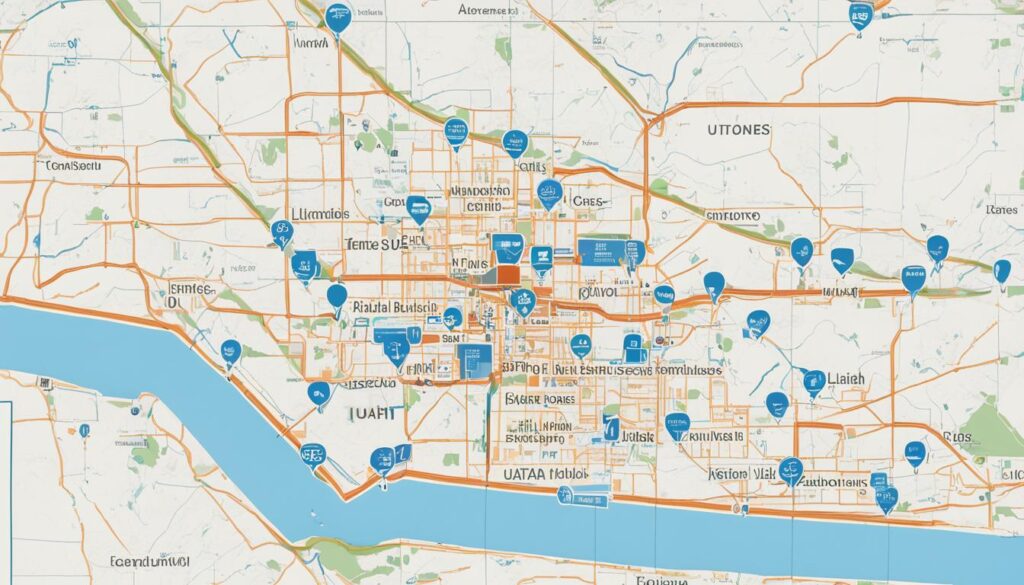Did you know California has over 23,558 religious congregations? It’s the second state with the most churches. This shows how important churches are in communities. But, it also makes us wonder: do churches need a business license?
Churches are different from regular businesses. Yet, they have to follow laws and handle money wisely. This is especially true when they make money from things other than worship.
Knowing your church’s money matters is key. It helps you follow state and local rules. You need to understand about getting licenses for religious groups. For example, you might need an Employer Identification Number (EIN) and tax exemptions. You can learn more about getting licenses here.
Key Takeaways
- California has over 23,558 religious congregations, the second highest in the U.S.
- Churches must comply with local and state regulations regarding business licenses.
- Obtaining an Employer Identification Number (EIN) is necessary for various financial activities.
- Each state has different requirements for church licensing and exemptions.
- Engaging in non-religious activities may necessitate obtaining additional permits.
Understanding Church Operations and Business Licenses
Churches often work as nonprofit organizations. This means they must follow state and local rules, especially about business licenses. It’s key to know the laws in your area well before starting.
Churches, like other nonprofits, need the right business licenses to operate legally. These licenses help keep things transparent and in line with local rules. Without them, your church could face fines, harming its reputation and work.
It’s smart to talk to local officials about the licenses your church needs. This way, you can handle the legal stuff well. What your church does and the services it offers will help figure out what licenses you need. For more on nonprofit rules, check out this source.
Does a Church Need a Business License
Figuring out if a church needs a business license can be tricky. Many churches get special exemptions because of their religious status. You might not need a license if your church doesn’t make money from activities like running a daycare or bookstore. The type of activities your church does plays a big role in this.
General Exemptions for Religious Institutions
Churches often get special breaks under church licensing rules. These breaks can change from state to state. But, they usually include:
- Tax-exempt status for money made from religious services.
- Exemptions from sales tax on donations and offerings.
- Exemptions from property taxes, with specific conditions.
Knowing about these exemptions can help your church avoid extra trouble and costs. But, if your church charges for goods or services, different rules might apply.
State-Specific Licensing Regulations
It’s important to know the rules in your state. Each state has its own rules that might affect your church’s need for a license. For example, in California, churches must follow property tax laws and zoning rules. It’s wise to check local laws and talk to lawyers, like Toews Law Group, Inc., to make sure you’re following the rules right. Not following the rules can cause legal problems and slow down your church’s growth.
Religious Institutions Legal Requirements
It’s key for churches to know the legal steps to take to start and run well. Getting incorporated is a big step. It helps churches get nonprofit status and protects leaders from personal legal trouble. This makes the church more credible and helps it work better in the community.
Incorporation and Nonprofit Status
Churches need to register at both the state and federal levels. They must file articles of incorporation that meet state rules. These rules include the church’s purpose, who to contact, and what kind of organization it is.
After filing and getting approval, the church becomes a legal entity. This lets them open bank accounts and accept donations. They also need a Federal Employer Identification Number (FEIN) for taxes and banking.
Corporate Formalities for Churches
Churches must follow rules to stay compliant as nonprofits. They need to make bylaws, hold regular meetings, and keep good records. They must also have a purpose clause that outlines their religious mission.
This ensures they meet 501(c)(3) guidelines. They also need a detailed plan for what happens to assets if the church closes. This plan must say that any leftover assets go to other tax-exempt groups.
By starting with a strong foundation through incorporation and following biblical principles, churches can achieve their goals. They also make sure they follow all legal requirements.

Church Licensing Regulations
It’s key to know about church licensing rules to keep your religious group strong and running smoothly. Getting the right permits is vital for things like hosting events and raising funds. Following local zoning laws helps your church stay within city rules, avoiding legal trouble.
Permits Required for Specific Activities
When planning events, think about the permits you need. Some activities, like gatherings or services, might need special permissions. Here are some examples:
- Community festivals
- Fundraising events
- Workshops or classes
- Housing homeless or providing community meals
Not getting the right permits can cause problems. It can hurt your church’s work and make people doubt your group.
Compliance with Local Zoning Laws
Local zoning rules are also very important. They tell you where your church can be and how you can use your land. Things that might affect these rules include:
- Property size and use
- Parking needs
- Building codes
- Sign rules
Knowing and following these rules helps avoid fines and legal problems. It’s smart to check your area’s zoning laws before starting any activities. This keeps your church in good shape with local authorities.
Tax Exemptions for Religious Organizations
It’s key to know about tax exemptions for religious groups to stay financially stable and follow the law. Getting 501(c)(3) status from the IRS lets churches and similar groups get federal tax breaks. This status not only saves them from some taxes but also lets them get funding and grants.
Understanding 501(c)(3) Status
Getting 501(c)(3) status is a big deal for many religious groups. This status usually means churches, synagogues, mosques, and other places of worship don’t have to pay federal taxes. But, they must follow strict rules, like not making money for private people. If they don’t fit these rules, they can still apply to the IRS for tax-exempt status.
State and Local Tax Exemptions
Religious groups also get tax breaks at the state and local levels. For example, they might not have to pay sales tax on things like food or materials for religious events. Also, property used only for worship might not have to pay local property taxes. But, they must file the right forms with the local assessor on time.
Even though these groups can make some money, straying too far from their main goals can lead to taxes. Knowing how to apply for these exemptions and following the rules can really help. To find out more about licenses and rules, check out your business licensing needs as an independent contractor here.
The Church Legal Structure
Having a strong church legal structure is key for smooth operations and following the law. It starts with filing articles of incorporation, which makes the church a nonprofit. This step gives the church legal status and sets up good internal governance.
The Importance of Articles of Incorporation
Filing articles of incorporation is a must for churches to get legal recognition. These documents are a key promise between members and the church. Since churches are nonprofits, they get 501(c)(3) status automatically. This status helps with fundraising and getting community support.
The articles of incorporation must include IRS required clauses. This includes a rule for what happens to assets if the church closes. Even if some states don’t require it, including these rules helps keep the church’s tax-exempt status safe.
Bylaws and Internal Governance
Bylaws are like a guide for church leadership, outlining how things work. They cover roles, decision-making, and more. Courts see the articles and bylaws as contracts between members. This makes things clear and helps the church stay focused on its mission.
Churches should follow legal rules when making bylaws. This keeps them in line with state laws and their articles. Also, they should watch for changes to avoid disagreements. In Florida and Washington, unclear rules have caused problems with leadership and decisions.

Church Business Permits
It’s important to know about church business permits to stay legal, especially for fundraising and community events. Local governments often need churches to get specific permits and licenses. Without the right documents, you could face legal issues that harm your church’s work.
Permits for Fundraising and Events
Getting the right permits for fundraising is key. These permits differ by area; some places don’t need them for nonprofits, while others do. You’ll need to follow local rules on:
- How to apply for event licenses.
- When to renew permits, usually every year.
- Local zoning rules.
In Atlanta, a zoning review fee is $50. Clayton County asks for registration through their Community Development Office. In Cobb County, you must register with the Community Development Department, Business License Division.
Licenses for Additional Services
Your church might also offer educational programs or childcare, which need special licenses. Think about:
- If your programs need special permits.
- Local rules for educational and childcare services.
- What documents prove your nonprofit status.
In DeKalb County, applying for a Business Occupational Tax Certificate (BOTC) might be free if you show you’re a nonprofit. Fulton County might not charge fees for some nonprofits, but you still need to talk to the Business Occupational Tax Division Office. This ensures your church follows local laws.
Non-Profit Organization Licenses
It’s important for churches to know about non-profit organization licenses. These rules help you follow state and federal laws. They also make sure your fundraising is open and honest.
Churches must understand the fundraising regulations they need to follow. They also need to know what documents are required.
Regulations for Fundraising Activities
In California, non-profits must get a business license. Even if they don’t have to pay the tax, they still need to show proof of non-profit status. This can come from the California Secretary of State or the IRS.
The cost to start is $30, but it might be more depending on your needs. Keeping up with fundraising regulations is key to staying compliant and protecting your non-profit status.
Documentation and Reporting Requirements
Keeping good records is crucial for your non-profit status. You must file a Statement of Information (Form SI-100) within 90 days of starting. To get federal tax exemption, you’ll need to use IRS Form 1023 or Form 1023-EZ.
For state tax exemption, you’ll need to file Form FTB 3500 or FTB 3500a. Regular reports are also needed to keep your good standing with the State of California and the IRS. These reports are important for documentation requirements and building trust.
Church Compliance Laws
It’s key to know church compliance laws to keep your organization strong. Churches have to follow rules like keeping financial records right, following employment laws, and obeying local zoning rules. These steps help avoid legal trouble and keep your church’s good name in the community.
If your church is a 501(c)(3), you get tax breaks and more. But, you also have to meet certain rules. For instance, you must file an annual tax return on IRS Form 990. This makes your church’s finances clear to everyone, building trust.
Also, not following these rules can risk your church’s tax-exempt status. Since 85% of U.S. churches are automatically tax-exempt, knowing the rules is crucial. Getting help from nonprofit law firms can be a big help. They guide you on what your church must do to stay legal and respected.




